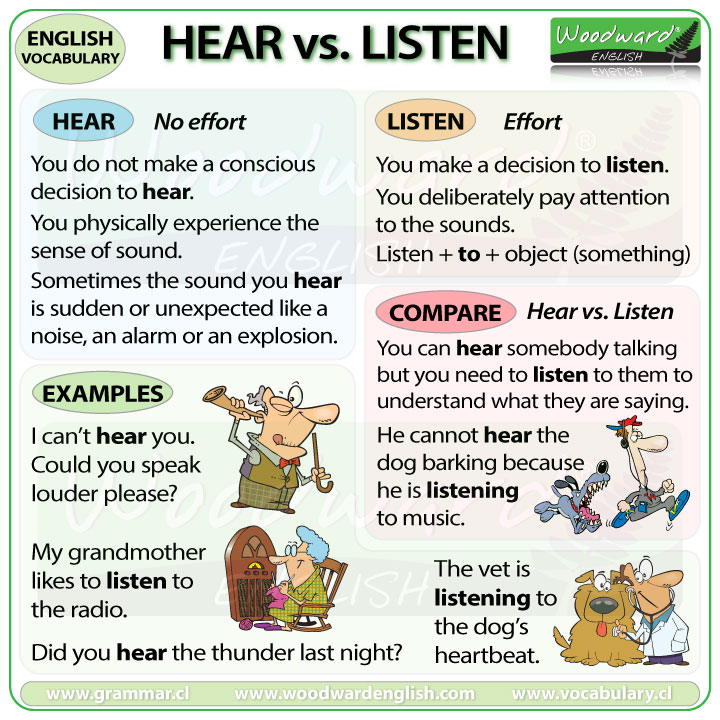See Look Watch Hear Listen
Learn English Vocabulary
The use of the verbs See, Look, Watch, Hear and Listen is very specific in most cases and are not normally interchangeable as is the case in other languages. It is therefore important to understand the basis of the use of each of these verbs.
See vs. Look vs. Watch
See is a verb of perception, it is a sense. It is automatic and doesn't require a decision to use this sense. It is associated with things that we can't avoid.
Look and Watch are action verbs that require a decision for you to use them. They never happen automatically.
Look is used to suggest a direction for your eyes. Usually we use this verb when the things we look at doesn't move.
Look - camera, prices, mirror, sky.
- Look at this picture.
- I like to look at the stars at night.
Watch is when we talk about concentrating on something, like a movie or sports. Using watch suggests there is a movement involved, so you can use that for TV or movies.
Watch - a movie, a TV program, a football match.
- I like to sit on the verandah and watch people walk by.
- I watch The Simpsons every day on TV.
Hear vs. Listen
Hear is another of our senses and so accordingly it is automatic. It does not require a conscious decision.
Hear - a noise, a voice, an explosion.
- You could hear the explosion from the next suburb.
- Do you hear voices in the night?
Listen is an action verb and you need to make a decision to do it. You can choose if you listen to something or not. For example you can hear somebody talking but you need to listen to them to understand what they are saying.
Listen - music, a speech.
- I can't listen to anything else you want to say. I'm so tired.
- I didn't want to listen to the President's speech but I didn't have a choice.

Examples of each verb
- I can see the mountains in the distance.
- Can you see the whiteboard from your seat?
- Look at the map to find where we are.
- Don't look at him for the answer - I asked you!
- I love to watch Game of Thrones on Sunday night.
- My husband watches the replays of the football on the weekend.
- I can't hear you. Could you speak louder please?
- Did you hear the thunder last night?
- You should always listen to your mother's advice.
- Can we listen to some different music? I'm sick of Luis Miguel!
It is also important to remember that the verb LISTEN is always followed by TO. Review the examples above and you will see this principle.
Next Activity
Try our interactive game to practice these verbs at: See Look Watch Hear Listen
If you found this English Vocabulary about See Look Watch Hear Listen interesting or useful, let others know about it.
